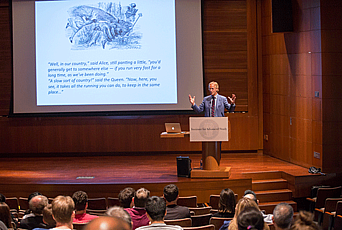
The Empty Half of the Glass May Also Be Full
By Avi Loeb, Member (1988–93, 2002–03) in the School of Natural Sciences:
“Such examples are often used to support the notion that the scientific method works and that the truth eventually prevails. But these success stories reflect a selection bias. For every case that barely made it to a successful end, there must have been many that never came to our attention since their value was never recognized. Bearing in mind the ‘ants in the kitchen’ metaphor, there must have been many scientific innovations that were suppressed, and their originators bullied, because they were ahead of their time. That these breakthroughs never came to fruition constitutes a net loss to humanity.
This lesson also reverberates throughout the professional life of scientists, including my own. My eventual focus on astrophysics was enabled by John Bahcall, who chose to offer an untrained foreigner like myself a five-year fellowship at the Institute for Advanced Study in Princeton. His generosity paid it forward three decades later—when I hired the brilliant, unrecognized scientist Manasvi Lingam as my postdoctoral fellow. My collaboration with Manasvi over the past four years blossomed into 35 papers and a forthcoming textbook. A similar but more extreme example involves the career of the mathematician Srinivasa Ramanujan, who produced groundbreaking theorems after being plucked out of obscurity based on the recognition of his raw talent by Godfrey Hardy of Cambridge University. There must be many Ramanujans in developing countries, who lack an opportunity to realize their talents.
...
Darwinian selection based on the principle of short-term popularity does not necessarily favor the most significant human creations for the long run. Rather than assuming that our evaluation system functioned well in selecting the worthiest products of our civilization, historians of arts and sciences should dig into past records in search for lost treasures.”
Read more at Scientific American.


